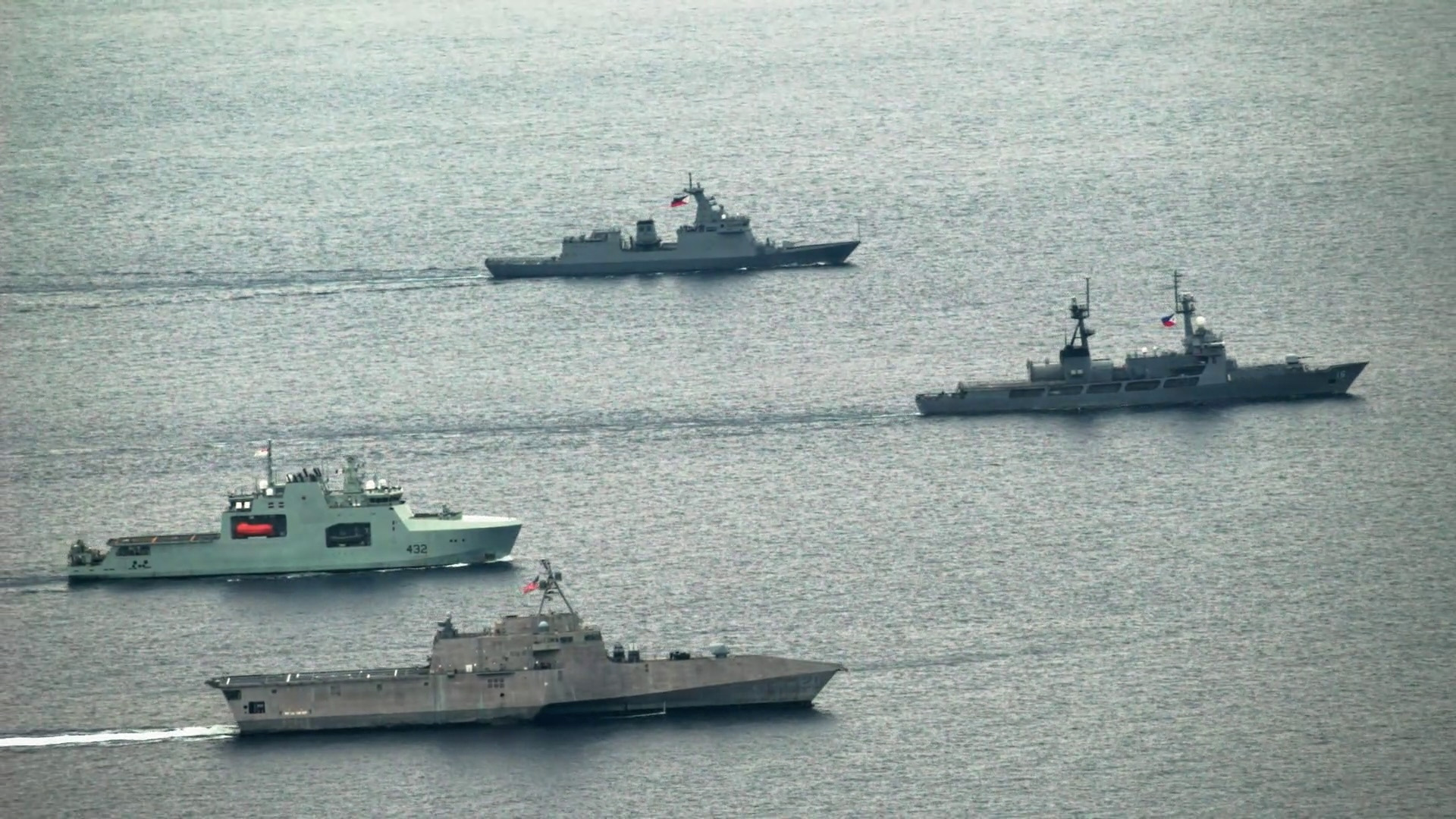Copyright Breaking Defense

China’s rapid expansion of military power in the Indo-Pacific has forced the US and its allies to rethink assumptions about deterrence, industrial capacity, and how conflicts may unfold across the region’s maritime, air, and space domains. From shipbuilding rates that far outpace the US Navy to increasingly assertive gray-zone activities at sea and in space, Beijing is reshaping the strategic environment faster than democratic security institutions are adapting. At the same time, new dynamics — including Russia’s tightening alignment with North Korea, and defense reforms in Japan and South Korea — are altering the balance of power in ways that go beyond just US-China rivalry. To better understand how these trends interact, what they mean for alliance strategy, and where deterrence is strongest or most vulnerable, Breaking Defense spoke with Philip Shetler-Jones, a senior analyst at the Royal United Services Institute (RUSI). He discusses China’s industrial and military advantages, the internal uncertainties inside the PLA, the strategic consequences of AUKUS shipbuilding timelines, and why Japan and the Philippines may be the decisive actors in any future crisis over Taiwan. Breaking Defense: What specific military capabilities and developments in China are driving the most concern for the US, the UK, and its allies? Shetler-Jones: The industrial power of China is the simple way of putting anxiety at the moment. That comes out in lots of dimensions. It comes out in the ships; the scale and pace of shipbuilding gives China not just the ability to put a large fleet at sea and more modernized equipment, but also the ability to maintain and potentially replace losses in war, which is a big difference between China and almost everyone else. That would be my number one: industrial power, manufacturing power. The second is an emanation of that, which is the scale of the Chinese fleet and the gradually improving sophistication. The next one is China’s progress in space and their boldness in terms of their ambitions [and] the kinds of capabilities they’re prepared to demonstrate. It doesn’t get a lot of press, but people who are working on the space dimension more exclusively do write a lot of concerning things about what the Chinese do with their space vehicles in terms of quite threatening, aggressive demonstrations of capability to deny space to others in a war scenario. I’ve also heard from more than one source in the last couple of months that there is now a sense of high confidence on the Chinese military side that they have reached a comfortable level of sea control within the First Island chain. The fact that they’re pushing power projection beyond that might suggest they’ve reached a satisfactory level of comfort in terms of controlling the sea near the Chinese coast. If you put those together – industrial capacity, ability to regenerate naval power, boldness in space, and surveillance confidence – that combination is what is driving concern. How do the recent purges of senior PLA officers affect your assessment of China’s readiness and decision-making on the use of force? We don’t know why so many senior officers are being purged. There are a number of theories about that. One is that it is a demonstration of Xi’s power over the military because he can do it, and he wants to make clear to everybody that he is in control of the PLA and they are not a potential threat to his authority. Then there is a theory on the opposite end, which is equally plausible, that these senior leaders are corrupt or plotting against him or could maneuver against him because now the PLA is so rich and so big that it is really the only plausible alternative source of power beside the party structure which Xi has mastered. I think that is still open for debate. But either way, it does not look like the relationship between the political leadership and the military is settled. I take that as having the consequence that the Chinese military is probably not ready to go to war in the sense of being optimized organizationally for war. But that does not mean they are not ready to go to war. Taking them to war might actually consolidate Xi’s authority. I do think it’s a sign of suboptimal relations between the military and the political leadership, but I don’t take comfort from that in terms of warning of conflict. What did the US, UK, and allies in the region take away from the recent Trump-Xi interactions and related diplomatic engagements? It conforms to my hunch for a while now, which is that Trump does not see conflict with China as being a high priority for him. I think he assumes some kind of equilibrium between China and the US is possible and sustainable, and he certainly does not want to have any kind of war or conflict going on between China and the US on his watch. When he talks about Xi assuring him that nothing would happen regarding Taiwan while he was president, he presents that as evidence that crises can be prevented by strong leadership. On the credit side, some of the things that I think will get more attention in the following days are all the other meetings that Trump and other US officials had with other countries in the region from Cambodia to Japan to Korea. By and large, that speaks well of the state of US alliances in the region and the commitment of leaders in the region to maintain those alliances and add to them dimensions like cooperation on rare earth processing, which might take a long time to emerge in practice but it certainly doesn’t conform to some of the other quite critical ideas about Trump [that say] he’s going to destroy all these relationships and people are going to give up on America or lose faith in the US alliance. That’s certainly not what I’m seeing. I see all the leaders trying to develop a good relationship with Trump, trying to explain the value of the alliances they have with the US in new terms just to keep a status quo, basically. Even Taiwan, there was a lot of speculation in advance of this trip that there might be a new communique or something with China that might put Taiwan at a disadvantage, but that seems to have not happened. Beyond China itself, what other strategic dynamics are shaping the security environment? Apart from the rise of China, [we’re seeing} the reorientation of the relationships between Russia-North Korea, Russia-China, and then the effect that has on Korea-Japan. Even taking out the US and China, you’ve got a commitment in the new leadership in South Korea and Japan despite being on distant ends of the political spectrum from each other to deepening their defense partnership and cooperation. The fact that not just South Korea announcing they’re going to build nuclear-powered submarines in the US, but also the Japanese accelerating their move up to or beyond two percent of GDP on defense, [and] also talking about looking into nuclear propulsion, also looking into creating a foreign intelligence organization and consolidating domestic intelligence [means) that reform movement in Japan and South Korea is speeding up. That has not just to do with China and China-US, but also Russia and Russia-North Korea, which looks like it’s certainly not a temporary relationship of convenience connected to the Ukraine war, but will last beyond that and be more significant. Countries are doing more to prepare for a loss of confidence in the US ability to service its commitments in the region. It’s not principally about the will or commitment of the US leadership; it’s more based on concern about the capacity of the US to present military on a scale and a technological level which could match China or match whatever kind of problems they might have with China, Korea, Russia, either in combination or separately. That’s another trend, which is that countries are getting ready to provide more for themselves by themselves or with other middle powers like we have with the GCAP program with the UK, Japan, and Italy. How do you assess the viability of the AUKUS submarine timeline, given the US isn’t able to build even two submarines per year domestically? [Trump] likes AUKUS because in [his] terms it feels like a good deal, because Australia’s paying America to build stuff and providing bases for America to deploy stuff, which is all to America’s benefit. But I think the question for Australia is can the US deliver on turning out the Virginia-class submarines sufficient to transfer a couple or more to Australia in time to fill the gap when its Collins-class submarines go out of service, which they’re already coming up to being overdue. That’s still a head scratcher for me. I don’t see the progress being made in the rate of production. And now we’re talking about South Korea’s submarines being also built in US shipyards. I don’t understand how that’s going to happen because it’s not just a matter of money or space. You have to have skills and you don’t create skills overnight. Skills are one of the biggest bottlenecks in the whole process to my eye. So it does seem like a bit of magical thinking. There’s quite an interesting debate within South Korea about whether this is a good investment of resources and it’s certainly true that not just nuclear propulsion, but nuclear weapons capability is much more discussed now in South Korea. Which allies are most critical to deterrence and stability in the region? Japan would be the outstanding one for me, followed by Australia. Japan is important to China, as well, economically, and the relations with Japan are very important. So it is a country with leverage beyond just its military capability. I would say it has, perhaps after China, still the most capable navy in the region. It’s gradually continuing to dispense with the post World War II constraints and taboos flowing from the constitutional interpretations of that. It’s a huge economy. So when they go from 2%, three or four or whatever, it makes an enormous difference. They’re able to translate that money into capability because they also have the industrial power and they have the high tech companies and the heavy industry. They’re in lots of areas. I mean surpassing the UK in space, for example. But the other one is just the position they sit in geographically. If you’re worried about Taiwan, Japan is by far the most critical variable about how Taiwan gets support, either with Japan’s acquiescence or even from Japan under certain circumstances, Japan sort of coming in behind the US or with the US. And if you take Japan out of the picture, the US’s whole posture in the region really doesn’t work. That’s still where most of the US forces are based and project out of; it is kind of irreplaceable real estate and also consent from the population, consent from the institutions. It’s really, really reliable and it has stable politics. And so when you look around at the other countries in the region, South Korea, Philippines, Taiwan, and then going down to Southeast Asia, I don’t think any of the other countries come close to Japan on those metrics. If you were asking the question, what country or which ally in the region has the most potential added value in the coming period, I think the Philippines would be my answer. It’s partly geography. If you go down the island chain, the two countries coming almost right up to the edge of Taiwan’s maritime zones are the Philippines from the bottom and Japan from the top. As an island, you have all the advantages in defense that an island has. The disadvantage is being cut off and blockaded. That’s why cooperation from Japan and the Philippines and keeping sea lanes open – imagine hugging their territorial water – you can get within a very close distance of Taiwan’s territorial water. You could continue to run supplies in and out of Taiwan even through an attempted blockade. The ability to put missiles, radars, and run ships through Philippines’ waters is important to maintaining the status quo with Taiwan. I understand you’re coming out with some new work on the growing UK-Japan relationship. Tell us about this. We developed this relationship with Japan for the last 15 or so years from an ambition to have a more meaningful peacetime partnership. A lot of it was about developing capabilities together, sharing lessons learned, exercising together, small-unit level to build capacities, and in some cases industrial as well as operational. Now we’re at the stage where we need to think more openly and seriously about what kind of relationship we would have in the event of a conflict or crisis. What kind of roles and responsibilities we might be expected to take on reciprocally between Japan and the UK. You’ve got a growing set of co-dependencies there. Look to GCAP for example. In the future we’re going to be tied together in ways where you’ve got to think through what that means. If one country or both countries end up in a war, what are you going to be expected to provide or what will you want to provide because you have those co-dependencies? We need to think that through.



